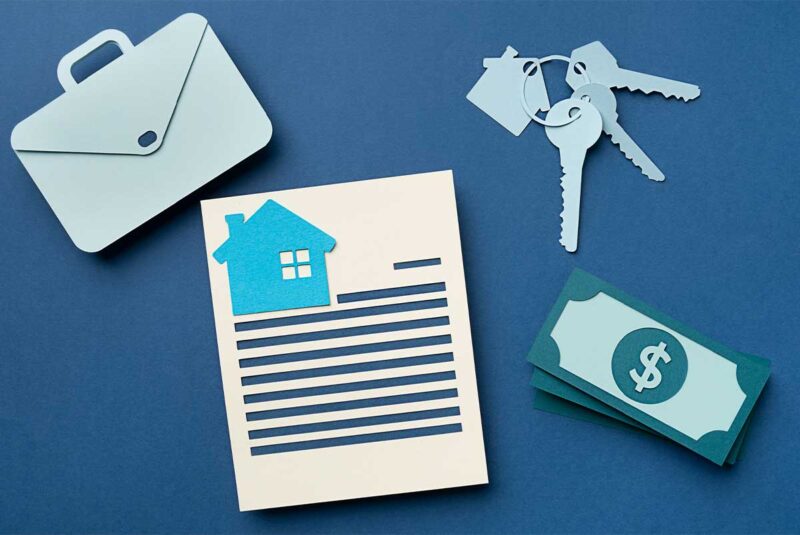Ready To Buy a Home?
Get Approved to Buy a Home
Rocket Mortgage® lets you get to house hunting sooner.
Unless you have the cash to buy a house outright, you’ll probably need to shop for a mortgage. But what’s the best way to go about doing that?
While the overall process can seem daunting at first, we’ve broken it down into seven straightforward steps. We’ve also included some tips at the end of the guide so that, if you follow it, you can feel confident you’re setting yourself up for mortgage success.
How To Shop for a Mortgage in 7 Steps
You don’t have to follow these steps in the exact order listed, but we do think you should at least touch on each of them. There’s no harm in being overprepared when it comes to a financial commitment like getting a mortgage.
1. Get financially prepared
It takes a lot of work to put yourself in a position to qualify for a mortgage with favorable terms. One of the first steps you’ll want to take is to check your credit score.
Most mortgages come with credit score minimums associated with them. In other words, you’ll need to have a credit score above the minimum threshold to qualify for the loan. If your credit score is low, you should focus on improving your credit score. Not only will this open up more potential loans you can qualify for, but it will also improve the loan terms you’ll be offered.
While you’re working on your credit score, it’s also a good idea to start saving up for a down payment. Credit score issues and problems with the down payment are two of the biggest obstacles first-time home buyers face. If you get those two things squared away at the beginning of your mortgage search, the entire process will be much more streamlined.
Take the first step toward buying a home.
Get approved. See what you qualify for. Start house hunting.
2. Research different mortgage options
Once you’re financially prepared to shop for mortgages, you’ll want to research the different mortgage options available. Here are some of the most common ones:
Conventional mortgage
Conventional loans are the most common type of home loan.[1] They’re called “conventional” loans because they aren’t associated with government programs.
They’re generally harder to qualify for than government home loans, but they offer some of the most favorable loan rates and costs you’ll find.
FHA loan
Federal Housing Administration (FHA) loans are one of the aforementioned government-backed loans. They’re specifically designed to help first-time home buyers achieve the dream of owning a home, particularly buyers who might struggle with credit score issues or the ability to make a large down payment.
VA loan
Department of Veterans Affairs (VA) loans are designed to help eligible service members, veterans and their spouses afford homes. You must meet VA loan eligibility criteria in order to receive a certificate of eligibility (COE). Providing your lender with a COE allows you to apply for this type of loan.
VA loans come with perks like no down payment requirement and competitive interest rates, often even lower than what you’ll see for conventional loans.
USDA loan
United States Department of Agriculture (USDA) loans help people purchase homes in rural areas. There are location restrictions in order to qualify, as well as income limits, but these loans also come with the perk of no down payment requirement.
3. Gather your documentation
You can technically do this step at any time before submitting your mortgage application, but this is as good a time as any. Lenders cannot just take your word regarding your financial circumstances; they’ll need to verify things for themselves. Documentation is how they do that.
Here’s a list of common documents you could be asked to provide:
- Identification
- Proof of address
- Bank statements
- W-2s
- Tax returns
- Employment verification
Your lender may ask for additional documentation to this list. We suggest providing them with whatever they need as quickly as you can to avoid delaying the application process, but don’t be scared to ask why they need the documents.
4. Talk to multiple lenders
Regardless of which type of mortgage you decide is best for your situation, you will have options for choosing a lender. Take the time to ask them questions and make sure that you are comfortable with their service offering and that you understand how much you’ll owe for the loan.
Annual percentage rate (APR) is the key metric when it comes to comparing loan costs, as it doesn’t just look at interest rates but also adds in lender fees. APR allows you to better compare the cost of borrowing from one lender versus another, and the true cost of the money you want to borrow.
Keep in mind, some lenders won’t offer certain types of loans for various reasons. If you’re interested in a specific loan, like a USDA loan, make sure to ask the lender if they offer that type of loan. If they don’t, you should ask what alternatives they might have to offer someone in your situation.
5. Apply for preapproval
We recommend applying for mortgage preapproval for a few different reasons:
- It streamlines the application process: Providing documentation for preapproval will usually speed things up when it’s time to close on the house.
- It strengthens your offer: Providing a preapproval letter along with your offer will strengthen your offer in the eyes of the seller because it validates that you will be able to secure financing.
- It gives you a concrete budget: Getting preapproved will give you a much more defined idea of how much you can afford. This is important information when searching for houses and deciding how much you’ll offer.
It’s possible to get preapproved with multiple lenders. In fact, it can be advantageous to do so. Applying for preapproval affects your credit score by causing a slight dip. That’s because in order to issue a preapproval, a lender will run a hard credit check, which causes a small, temporary drop in your score.
However, if you apply for preapproval with multiple lenders, know that all credit checks within a 14-day window will count as the same credit check. This allows you to comparison shop lenders without drastically affecting your credit.
6. Find the house
With a preapproval letter (preferably multiple letters), you’re ready to start house hunting. We suggest using a real estate agent to help you navigate the process, especially if it’s your first time.
Once you’ve found the right house, submit an offer and go through any rounds of negotiation with the seller. Obviously, there’s a lot that goes into finding a house and making the right offer. But as far as the mortgage is concerned there’s not a lot to do right now, especially if you’re already preapproved.
The lender will need the specifics of the property (address, sale price, etc.) in order to proceed. Once the seller accepts your offer and the house goes under contract, you’re ready to close.
7. Close on the loan
Shopping for a mortgage is a bit strange because so much work goes into it before you actually close on the loan. Technically, the mortgage application and closing is the last step, and that gets finalized on closing day. But several steps in the closing process must happen first.
- Home appraisal: Lenders usually require an appraisal to make sure that the property is worth the amount they’re lending you.
- Home inspection: Depending on the type of loan you’re applying for, the lender may require an inspection. Either way, they’re a good idea as they will let you know if there are any issues with the house or urgent repairs that need to be made.
- Closing costs: You’ll need to pay the closing costs associated with the mortgage. This includes things like the loan origination fee, the fee for the title search and insurance, and much more.
The good news is that you won’t be alone in this process. Both the lender and your real estate agent should be in regular communication with you and provide context for whatever they’re asking you for.
Mortgage Shopping Tips
Following the steps outlined above should put you in good shape for finding the right mortgage. Here are some additional tips to keep in mind that could save you time, money and headaches.
Create a short list of lenders
Remember, you have 14 days from when the first lender pulls your credit to get preapproved by as many lenders as you’d like using the same credit pull. We suggest creating a short list of lenders that you know you’d like to get preapproved by before applying for the first preapproval. This will ensure that you can apply with all of them before the 14-day window expires.
Ask about promotions and deals
Many mortgage lenders will run promotions related to expenses like the down payment or closing costs. They might also offer perks related to refinancing down the road. Make sure to ask about these deals so that you can incorporate them into your calculations and decision-making process.
Don’t try to “time” the market
Despite the forecasts of financial experts, nobody knows for certain what interest rates will be doing six months from now– let alone a year. If you have the funds to purchase a house now, waiting for interest rates to drop could be a big mistake.
Purchasing when you have the funds will allow you to start building equity as soon as you’re able. Plus, you can always refinance if the market improves and interest rates drop in the future.
Budget for repairs
No house is perfect and things will break. Make sure that you account for this and give yourself some extra cushion in your budget when you first move in. You’ll also want to account for additional expenses like moving or potentially breaking a lease.
How to Shop for a Mortgage FAQs
Yes. There could be significant differences with the interest rates and fees different lenders charge. These differences could add up to thousands of dollars over the life of the loan.
No. Any lender will need to run a hard credit check to issue you a loan, which will drop your credit slightly in the short term. However, any additional hard credit checks lenders run within a 14-day period will count as the same one. So you aren’t damaging your credit so long as you shop during that 14-day window.
<p>If you’re worried about interest rates going up, <a href=”https://moneytips.com/lock-mortgage-rate/”>locking in a rate</a> can give you peace of mind. It’s not something that you must do in order to get a mortgage, but it’s an option worth considering.</p>
It varies by lender, but it can be as fast as a few business days. You can expedite the process by promptly providing your lender with whatever documentation and additional information they ask for.
Final Thoughts on How To Shop for a Mortgage
The house-hunting process can seem like a race at times, but when it comes to buying a mortgage, make sure to slow down and consider all of your options. From the type of mortgage to the lender, there are a lot of choices to make. Weigh the pros and cons of each option so that you can feel as comfortable as possible before proceeding.
The Short Version
- Take steps to build your credit while saving up for a down payment. The more financially prepared you are, the easier the process will be and the better loan terms you’ll receive
- Talk to multiple lenders and decide what type of mortgage you want. Apply for a preapproval with multiple lenders to secure the best deal
- Ask potential lenders as many questions as you need to. Don’t be afraid to mention you’re speaking with other lenders and ask them what they can do to earn your business
Consumer Finance. “Conventional Loans.” Retrieved October 2023 from https://www.consumerfinance.gov/owning-a-home/loan-options/conventional-loans/




